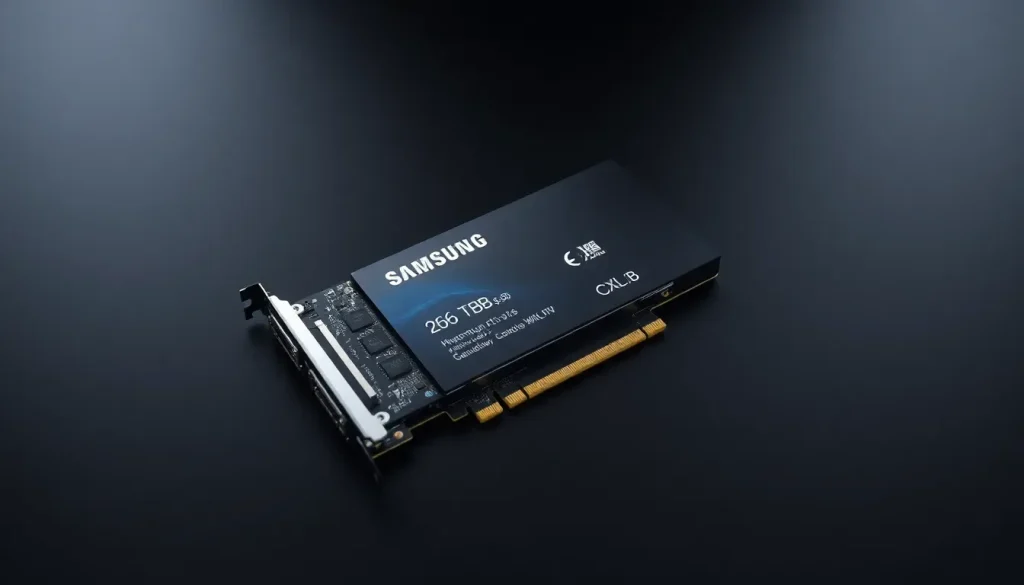Samsung 256 TB PCIe 6.0 SSD with CXL 3.1 Launching in China 2024

As the global landscape of technology continues to evolve, China is increasingly becoming a focal point for innovation, particularly in the realm of data storage solutions. The recent GMIF 2025 Innovation Summit held in Shenzen showcased some of the most cutting-edge advancements in this field. Among the noteworthy announcements, Samsung revealed its groundbreaking PCIe 6.0 SSD with a staggering 256 TB capacity, specifically designed for the growing demands of AI data centers, set to launch next year.
While the company has kept many details under wraps, the implications of this innovation are significant. It signals a pivotal moment for storage technology, especially as Samsung plans to introduce a version with double the capacity—512 TB—by 2027. This leap forward is anticipated to be fueled by the adoption of Extreme Ultraviolet (EUV) lithography in NAND Flash production, marking a transformative era akin to significant milestones in CPU advancements.
Samsung unveils its PCIe 6.0 SSD with CXL 3.1 and 256 TB for AI data centers
The introduction of Samsung's PCIe 6.0 SSD is a clear indication of the company's commitment to meeting the demands of enterprise-level storage solutions. These high-performance units are not meant for average consumers; they are tailored for organizations that require unparalleled speed and capacity. To better understand its significance, we need to explore the implications of the Compute Express Link (CXL) standard.
CXL is an open standard designed for cache-coherent connectivity between CPUs, memory, and accelerator devices, built on PCIe technology. This standard allows devices to share memory with the host system transparently, eliminating the need for redundant data copying and thereby significantly reducing system latency. As a result, the overall efficiency and responsiveness of servers dramatically improve.
The upcoming CXL 3.1 version, which Samsung plans to implement in its new SSD, was launched in 2023 and introduced features such as the Trusted Execution Environment Protocol (TSP). This protocol enhances security in trusted environments by maintaining memory coherence. Other notable improvements include Global Integrated Memory (GIM) and Port Based Routing (PBR), both integrated into this advanced storage solution.
MVP 1 256 TB: A prototype for 2026 with a successor boasting 512 TB
The Samsung MVP 1, while appearing to be a prototype, hints at the company's ambitious goals for the future. This SSD will utilize an EDSFF connector, likely in the E3.L form factor, featuring a unique PCB design that accommodates flexible cabling. This innovative design supports a modular system that consists of 64 NAND Flash modules and 9 DRAM modules, collectively delivering the impressive 256 TB capacity with coherent memory access.
Compared to the prototype showcased in 2023, the latest design reflects a refined arrangement of electronic components on the PCB, enhancing both signal quality and thermal management. The promise of a 512 TB version just a year later has generated excitement among AI data centers, as the need for higher capacity, speed, and memory coherence is critical for ongoing advancements in the sector.
To illustrate the urgency within this landscape, consider that all available 128 TB SSDs have already been sold out for the remainder of 2025, with portions of the 2026 production already allocated. The demand showcases the critical nature of high-capacity storage solutions, as industry players are racing to meet these needs.
- SK Hynix, Samsung, and Micron are ramping up production to meet the demand.
- ASML's EUV scanners are being sold at an unprecedented rate to these leading companies.
- Both DRAM and NAND Flash technologies are poised for significant advancements before the decade's end.
The race for enhanced storage capabilities is not just about capacity; it’s also about speed and efficiency. As AI applications become increasingly sophisticated, the infrastructure supporting them must evolve correspondingly. With innovations such as Samsung's upcoming SSDs, data centers can expect to handle larger datasets more efficiently, paving the way for breakthroughs in AI research and application.
In summary, advancements like the Samsung PCIe 6.0 SSD with CXL 3.1 are not merely incremental improvements; they represent a significant leap toward the future of data storage. As companies like Samsung continue to push the boundaries of technology, we can anticipate a wave of new possibilities in how data is stored, accessed, and utilized across various sectors.




Leave a Reply